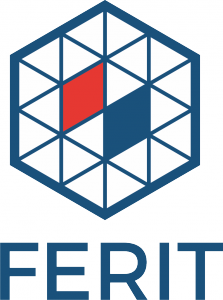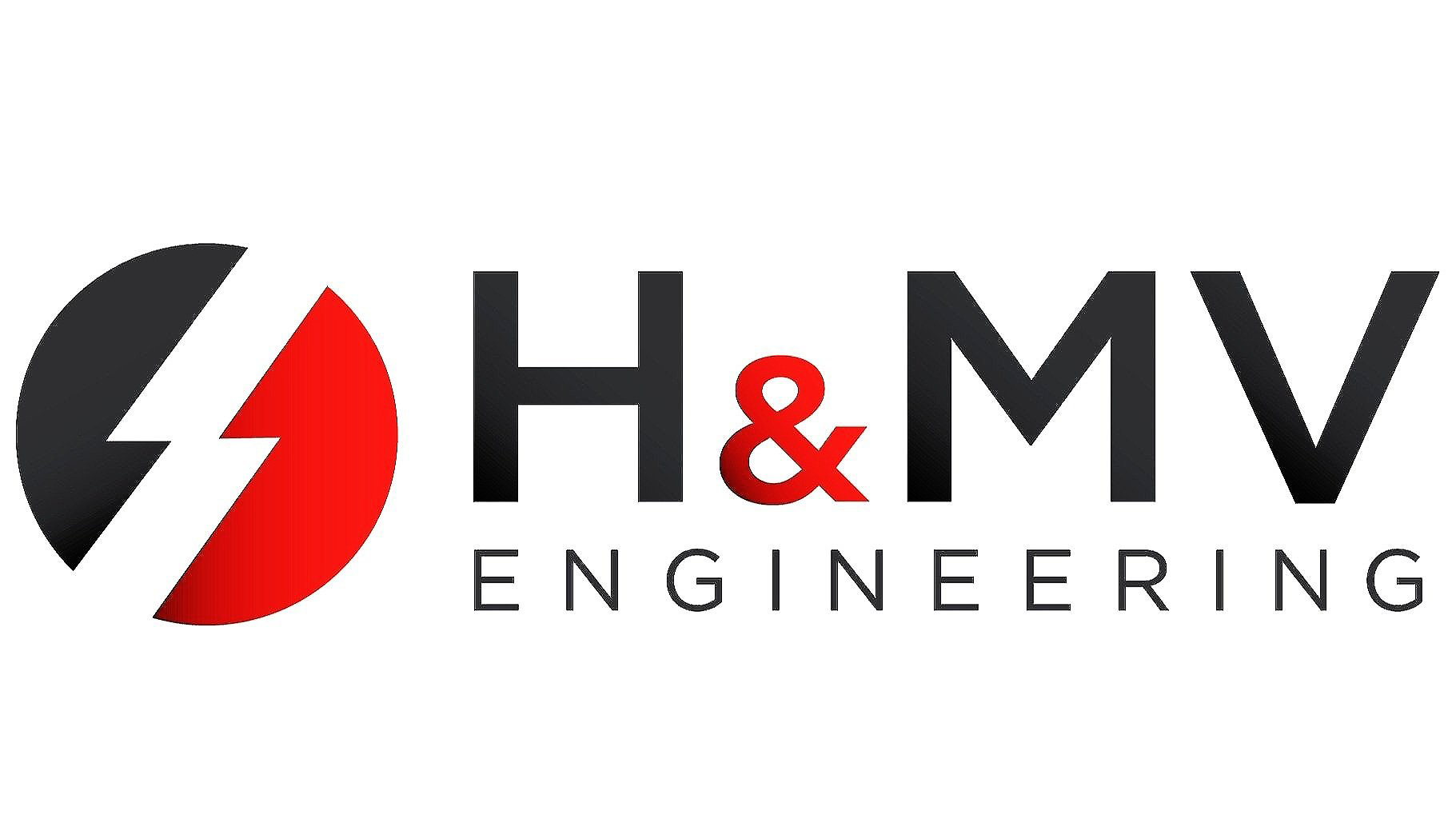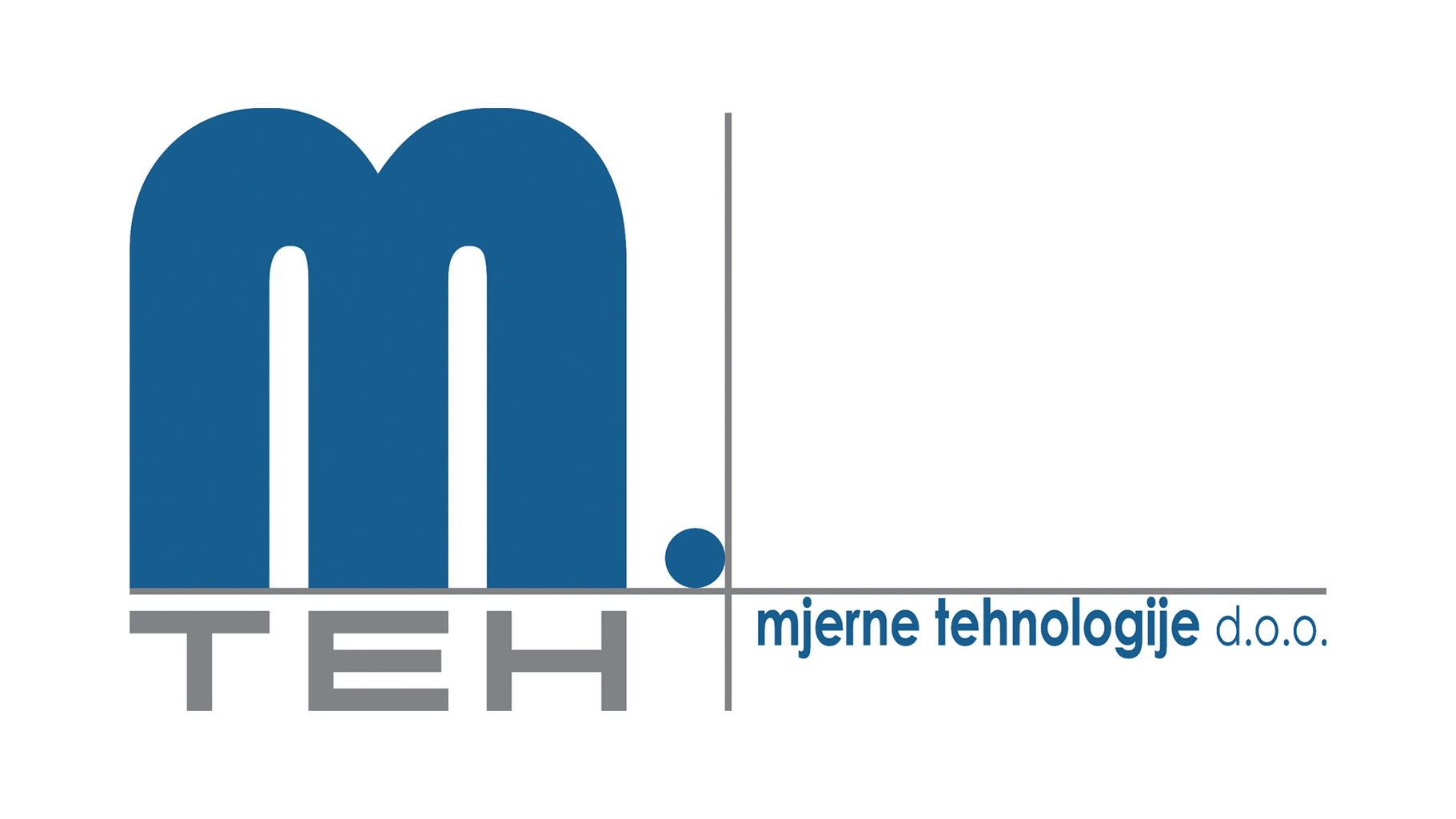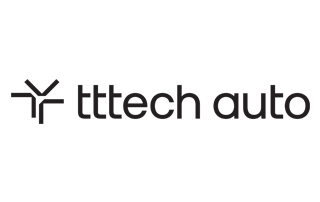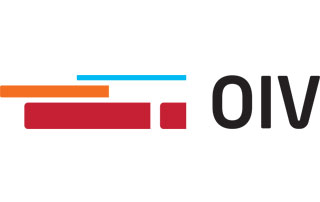
SST2024, October 16-18 2024, FERIT, Osijek
CONFERENCE CHAIRS
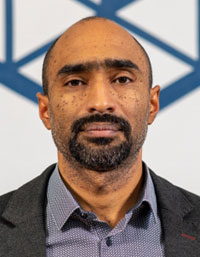
General Chair
Emmanuel Karlo Nyarko
Faculty of Electrical Engineering, Computer Science and Information Technology Osijek,
Josip Juraj Strossmayer University of Osijek,
Kneza Trpimira 2b, Osijek, Croatia
+385 31 495 403
e-mail:
karlo.nyarko@ferit.hr
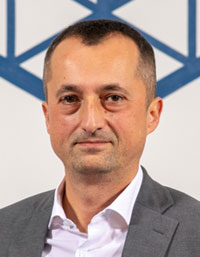
Program Chair
Tomislav Matić
Faculty of Electrical Engineering, Computer Science and Information Technology Osijek,
Josip Juraj Strossmayer University of Osijek,
Kneza Trpimira 2b, Osijek, Croatia
+385 31 224 602
e-mail:
tomislav.matic@ferit.hr
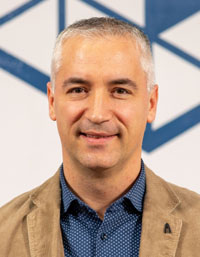
Program Chair
Mario Vranješ
Faculty of Electrical Engineering, Computer Science and Information Technology Osijek,
Josip Juraj Strossmayer University of Osijek,
Kneza Trpimira 2b, Osijek, Croatia
+385 31 224 670
e-mail:
mario.vranjes@ferit.hr
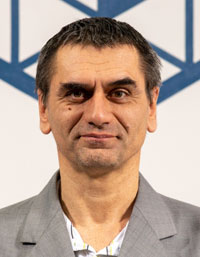
Registration Chair
Marinko Barukčić
Faculty of Electrical Engineering, Computer Science and Information Technology Osijek,
Josip Juraj Strossmayer University of Osijek,
Kneza Trpimira 2b, Osijek, Croatia
+385 31 224 685
e-mail:
marinko.barukcic@ferit.hr
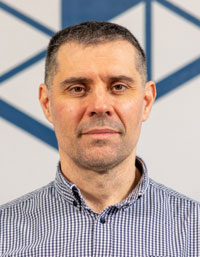
Publication Chair
Robert Cupec
Faculty of Electrical Engineering, Computer Science and Information Technology Osijek,
Josip Juraj Strossmayer University of Osijek,
Kneza Trpimira 2b, Osijek, Croatia
+385 31 495 427
e-mail:
robert.cupec@ferit.hr
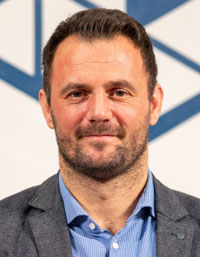
Publicity/Web Chair
Danijel Topić
Faculty of Electrical Engineering, Computer Science and Information Technology Osijek,
Josip Juraj Strossmayer University of Osijek,
Kneza Trpimira 2b, Osijek, Croatia
+385 31 224 614
e-mail:
danijel.topic@ferit.hr
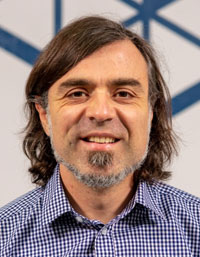
Publicity/Web Chair
Josip Balen
Faculty of Electrical Engineering, Computer Science and Information Technology Osijek,
Josip Juraj Strossmayer University of Osijek,
Kneza Trpimira 2b, Osijek, Croatia
+385 31 224 759
e-mail:
josip.balen@ferit.hr
STEERING COMMITTEE
Guillem Alenyà
Institut de Robòtica i Informàtica Industrial, Spain
Ertuğrul Başar
Koç University, Turkey
Nina Begičević-Ređep
University of Zagreb, Croatia
Frederik De Belie
Ghent University, Belgium
Vedran Bilas
University of Zagreb, Croatia
Matjaž Colnarič
University of Maribor, Slovenia
Božidar Filipović-Grčić
HRO-CIGRE, Croatia
Julius Georgiou
University of Cyprus, Cyprus
Gordan Gledec
University of Zagreb, Croatia
Mislav Grgić
University of Zagreb, Croatia
Andrej Gubina
University of Ljubljana, Slovenia
Francisco Gonzalez-Longatt
University of South-Eastern Norway, Norway
Norbert Herencsar
Brno University of Technology,
Czech Republic
Željko Hocenski
J.J. Strossmayer University of Osijek, Croatia
Georges Kaddoum
University of Quebec, Canada
Marina Klačmer Čalopa
University of Zagreb, Croatia
Ignac Lovrek
University of Zagreb, Croatia
Francisco Martínez Álvarez
Universidad Pablo de Olavide, Spain
Ngoc Thanh Nguyen
Wroclaw University of Technology, Poland
Srete Nikolovski
J.J. Strossmayer University of Osijek, Croatia
Miloš Oravec
Slovak University of Technology, Slovakia
Hrvoje Pandžić
University of Zagreb, Croatia
Davor Pavuna
École Polytechnique Fédérale de Lausanne (EPFL), Switzerland
Nedjeljko Perić
University of Zagreb, Croatia
Ivan Petrović
University of Zagreb, Croatia
Sasikumar Punnekkat
Mälardalen University, Sweden
Ivan Samardžić
University of Slavonski Brod, Croatia
Goran Slipac
HRO-CIGRE, Croatia
Andrea M. Tonello
Alpen-Adria-Universität Klagenfurt, Austria
Mladen Vouk
North Carolina State University, USA
Drago Žagar
J.J. Strossmayer University of Osijek, Croatia
PROGRAM COMMITTEE
Mato Baotić
University of Zagreb, Croatia
Tin Benšić
J.J. Strossmayer University of Osijek, Croatia
Zlatko Čović
Subotica Tech – College of Applied Sciences, Serbia
Mario Dudjak
J.J. Strossmayer University of Osijek, Croatia
Damir Filko
J.J. Strossmayer University of Osijek, Croatia
Sergi Foix
Universitat Politècnica de Catalunya, Spain
Irena Galić
J.J. Strossmayer University of Osijek, Croatia
Ratko Grbić
J.J. Strossmayer University of Osijek, Croatia
Sonja Grgić
University of Zagreb, Croatia
Francesco Grimaccia
Politecnico di Milano, Italy
Marija Habijan
J.J. Strossmayer University of Osijek, Croatia
Daniel Hofman
University of Zagreb, Croatia
Damir Jakus
University of Split, Croatia
Tomislav Keser
J.J. Strossmayer University of Osijek, Croatia
Tatjana Konjić
University of Zagreb, Croatia
Dražan Kozak
University of Slavonski Brod, Croatia
Mario Kusek
University of Zagreb, Croatia
Edin Lakić
University of Ljubljana, Slovenia
Benjamin Lehmann
Hochschule Bremen, Germany
Ivan Magdalenić
University of Zagreb, Croatia
Vlado Majstorović
University of Mostar, Bosnia and Herzegovina
Ivan Marković
University of Zagreb, Croatia
Goran Martinović
J.J. Strossmayer University of Osijek, Croatia
Tomi Medved
University of Ljubljana, Slovenia
Branimir Novoselnik
University of Zagreb, Croatia
Gregor Papa
Jožef Stefan Institute, Slovenia
Marcin Paprzycki
Systems Research Institute of the Polish Academy of Sciences, Poland
Petra Pejić
J.J. Strossmayer University of Osijek, Croatia
Rene Prenc
University of Rijeka, Croatia
Snježana Rimac-Drlje
J.J. Strossmayer University of Osijek, Croatia
Slavko Rupčić
J.J. Strossmayer University of Osijek, Croatia
Vasilija Sarac
Goce Delčev University of Štip, North Macedonia
Sebastijan Seme
University of Maribor, Slovenia
Dejan Škvorc
University of Zagreb, Croatia
Vlado Sruk
University of Zagreb, Croatia
Marinko Stojkov
University of Slavonski Brod, Croatia
Domagoj Tolić
Rochester Institute of Technology, Croatia
Josip Vasilj
University of Zagreb, Croatia
Ivan Vidović
J.J. Strossmayer University of Osijek, Croatia
Tomislav Volarić
University of Mostar, Bosnia and Herzegovina
Denis Vranješ
J.J. Strossmayer University of Osijek, Croatia
Mario Vražić
University of Zagreb, Croatia
Bruno Zorić
J.J. Strossmayer University of Osijek, Croatia
Matej Žnidarec
J.J. Strossmayer University of Osijek, Croatia
ORGANIZING COMMITTEE
Anamarija Lazić Bratek
J.J. Strossmayer University of Osijek, Croatia
Davor Begić
J.J. Strossmayer University of Osijek, Croatia
Domagoj Bilandžija
J.J. Strossmayer University of Osijek, Croatia
Dragana Božić Lenard (Head of Organizing Committee)
J.J. Strossmayer University of Osijek, Croatia
Viktorija Dozan
J.J. Strossmayer University of Osijek, Croatia
Mirela Glavaš
J.J. Strossmayer University of Osijek, Croatia
Mirta Hanzer
J.J. Strossmayer University of Osijek, Croatia
Ivana Hartmann Tolić
J.J. Strossmayer University of Osijek, Croatia
Željko Jeršek
J.J. Strossmayer University of Osijek, Croatia
Zorislav Kraus
J.J. Strossmayer University of Osijek, Croatia
Jasminka Majdandžić
J.J. Strossmayer University of Osijek, Croatia
Marina Maslać Popadić
J.J. Strossmayer University of Osijek, Croatia
Mario Miloloža
J.J. Strossmayer University of Osijek, Croatia
Marina Peko
J.J. Strossmayer University of Osijek, Croatia
Maristela Primorac
J.J. Strossmayer University of Osijek, Croatia
Krešimir Romić
J.J. Strossmayer University of Osijek, Croatia
Marko Šarić
J.J. Strossmayer University of Osijek, Croatia
Marijana Širić
J.J. Strossmayer University of Osijek, Croatia
Robert Šojo
J.J. Strossmayer University of Osijek, Croatia
Ana Šokčević
J.J. Strossmayer University of Osijek, Croatia
Tihana Vajnand
J.J. Strossmayer University of Osijek, Croatia
Davor Vrandečić
J.J. Strossmayer University of Osijek, Croatia
Stephen Ward
J.J. Strossmayer University of Osijek, Croatia
IMPORTANT DATES
CONFERENCE
Extended deadline (FINAL)
3rd June, 2024
Conference paper submission deadline
Extended deadline
30th June, 2024
Notification of conference paper acceptance
Extended deadline
21st July, 2024
Final conference paper submission
14th Sept., 2024
Conference registration
SPECIAL SESSION AND WORKSHOP PROPOSALS
15th March, 2024
Workshop and special session proposal submission
31th March, 2024
Workshop and special session proposal acceptance
Extended deadline (FINAL)
3rd June, 2024
Workshop/special session paper submission
Extended deadline
30th June, 2024
Notification of workshop/special session paper acceptance
Extended deadline
21st July, 2024
Final paper submission
14th September, 2024
Workshop/special session registration
TOPICS
Topics for submission include but are not limited to:
- Affective Computing
- Agriculture Automation
- Applied Electromagnetics in Smart Systems
- Artificial Intelligence
- Big Data and Smart Systems
- Biometrics and Smart Systems
- Cloud Computing
- Control Systems and Robotics
- Cyber-Physical Systems
- Dependable Computer Systems
- Embedded Computer Systems
- Green Communication
- Green Computing
- High Performance Computing
- Image and Video Processing
- Intelligent Power Systems and Environments
- Intelligent Transportation Systems
- Internet of Things
- Microgrid
- Mobile and Wireless Networks
- Security and Privacy
- Smart Antennas
- Smart Grid
- Smart Health
- Smart Houses and Cities
- Smart Power Systems
- Smart Systems and Technologies in Education
- Smart Systems for Green Energy
- Smart Systems in Business Information Systems
- Software Engineering for Smart Systems
SST 2024 – CONFERENCE PROGRAM
Conference venue: Hotel Osijek, Šamačka ul. 4, 31000, Osijek, Croatia
Wednesday, 16 October 2024
Registration
09:00 – 10:00
Greetings/Opening ceremony
(Room A – Lipa)
10:00 – 10:30
Keynote Lecture
(Room A – Lipa)
10:30 – 11:30
Chair: Emmanuel Karlo Nyarko
Frederik De Belie
Supporting the Flemish Manufacturing Industry through the Research Centre “Flanders Make”:
Experiences from an Academic Perspective
Coffee Break + Poster Session (Sponsors)
11:30 – 12:15
Antenna Design and Signal Modulation
(Room A – Lipa )
12:15 – 13:45
Chair: Marijan Herceg
Tomislav Barić, Hrvoje Glavaš and Vanja Mandrić
Hybrid UHF Quad Antenna for Indoor Use
Luka Filipović, Marijan Herceg, Domagoj Bilandžija and Jelena Šuljug
Influence of gender and physical constitution on the ISK-CC-HBC modulation scheme
Vanja Mandrić, Slavko Rupčić, Bogdan Pavković and Josip Ilakovac
Impact of parameters for the in-situ measurement of the electric field strength of the SSB signal in a 5G NR system using the frequency-selective
Adrian K. Stavrakis, Melina Ioannidou and Goran Stojanović
A novel, fluidically reconfigurable patch antenna utilizing conductive fabrics
Josip Šabić, Toni Perkovic and Petar Šolić
Chirp Detection and Signal Transmission: a HackRF Reactive Attack
Machine Learning & Computer Vision Based Applications
(Room B – Kesten)
12:15 – 13:45
Chair: Snježana Rimac-Drlje
Online
Taha Yasin Er and Seda Selçuk
Enhancing Road Anomaly Detection with Dynamic Cropping System: A YOLOv8 Integrated Approach
Antonio Antunović, Emmanuel Karlo Nyarko and Damir Filko
Wound Tissue Classification: A Comparative Analysis of Deep Neural Network Models
Jana Dukić, Petra Pejić, Andrej Bošnjak and Emmanuel Karlo Nyarko
BRANCH – a Labeled Dataset of RGB-D Images and 3D Models for Autonomous Tree Pruning
Dejan Bogosavljev and Željko Lukač
Image Classification of partially labeled Datasets using the Latent Space Representation of Autoencoders
Matej Arlović, Davor Damjanović, Franko Hržić and Josip Balen
Synthetic dataset generation methods for computer vision application
Lunch (Hotel Osijek)
13:45 – 15:00
Special Session:
Creating synergies in Widening countries on the topic of low-voltage grid management – SynGRID
(Room A – Lipa)
15:00 – 16:30
Organizers:
- Institute for Innovation and Development of University of Ljubljana, Slovenia
- Institute of Communication and Computer Systems of National Technical University of Athens, Greece
- Faculty of Electrical Engineering, Computer Science and Information Technology Osijek of University of Osijek, Croatia
- Faculty of Electrical Engineering and Computing of University of Zagreb, Croatia
- Petrol, Slovenija
Innovations in Educational Technologies, Network Systems and Cybersecurity
(Room B – Kesten )
15:00 – 16:30
Chair: Drago Žagar
Online
Mehdi Hatamian
Supplementary Learning: Toward Enriching Microlearning from Design Perspective
Okan Özçetin and Mümin Tolga Emirler
Threat Analysis and Risk Assessment and Countermeasures Against Threat Scenarios for Steer-by-Wire System
Filip Škrabák, Jakub Dubec and Pavel Čičák
Definition and Visualization of Protocols in Computer Networks
Online
Faysal Ahmmed, Mohammad Nasfikur Rahman Khan, Md Khizir Al Zabir, Bhushan Lohar and Kari Lippert
Concept Exploration of Virtual Humans in Education
Welcome cocktail (Hotel Osijek)
20:00 – 22:00
Thursday, 17 October 2024
Registration
09:00 – 9:30
Photovoltaic Systems and Applications
(Room A – Lipa)
09:30 – 11:00
Chair: Zvonimir Klaić
Matej Cenký, Jozef Bendík and Illia Lazarenko
Rooftop Photovoltaic Potential Estimation Using QGIS and Simple Building Shadow Analysis
Heidi Adrić, Zvonimir Klaić, Mario Primorac and Krešimir Fekete
Analysis of Harmonic Distortion in Low-voltage Distribution Network Caused by Photovoltaic Power Plants and Electric Vehicle Chargers
Josip Vasilj, Damir Jakus, Joško Novaković and Danijel Jolevski
Solar Irradiation High Frequency Simulation Model
Sebastijan Seme, Eva Simonič and Klemen Sredenšek
Agrivoltaic – A photovoltaic system on a greenhouse
Alen Mazalica, Dominik Buzov and Danijel Topić
Application of photovoltaic systems for power supply heat pumps
Machine Learning Applications and Knowledge Representation
(Room B – Kesten)
9:30 – 11:00
Chair: Bruno Zorić
Dražen Bajer, Bruno Zorić and Mario Dudjak
Reducing meta-level data in stacking ensembles for classification
Vili Podgorelec, Špela Pečnik, Zala Lahovnik and Grega Vrbančič
Long-term electricity consumption forecasting: how different prediction models forecast into the future
Matej Kuprešak, Časlav Livada, Tomislav Galba and Alfonzo Baumgartner
Pathfinding in procedurally generated mazes
Manuel Jesús Jiménez Navarro, Angela del Robledo Troncoso García, Alicia Troncoso, Francisco Martínez-Álvarez and María Martínez Ballesteros
Explainable Deep Learning with Embedded Feature Selection for Electricity Demand Forecasting
Martina Ašenbrener Katić, Sanja Čandrlić and Marina Rauker Koch
Transformation of Natural Language Interrogative Sentences into Question Formalized Node of Knowledge (QFNOK) Record
Abu Shad Ahammed and Roman Obermaisser
Smart Health Software to Support Rescue Personnel in Emergency Situations
Coffee Break
11:00 – 11:30
Keynote Lecture
(Room A – Lipa)
11:30 – 12:30
Chair: Mario Vranješ
Milan Bjelica
Making Smart Systems Safe and Secure: Caveats and Blueprints from the Automotive Industry
Lunch (Hotel Osijek)
12:45 – 14:00
Special Session:
Radiofrequency Spectrum Management and Monitoring
(Room A – Lipa)
14:00 – 15:30
Organizers:
- Ana Katalinić Mucalo, Josip Milanović, Mario Gal, Croatian Regulatory Authority for Network Industries (HAKOM)
PhD Forum
(Room B – Kesten)
14:00 – 15:30
Coffee Break
15:30 – 16:00
Special Session:
Cutting-edge algorithms for innovations in cloud-based business intelligence solutions
(Room A – Lipa)
16:00 – 17:00
Organizers:
- Faculty of Electrical Engineering, Computer Science and Information Technology Osijek
- Uvid d.o.o.
Gala Dinner (Projekt 9)
19:00 – 23:00
Friday, 18 October 2024
Registration
08:30 – 09:00
Power Systems Analysis and Resilience
(Room A – Lipa)
09:00 – 10:45
Chair: Krešimir Fekete
Hrvoje Glavaš, Dražen Dorić and Antun Severović
Analysis of the USB standard as a power supply
Tekai Eddine Khalil Zidane, Younes Zahraoui and Pietro Elia Campana
Microgrids Resilience Against Extreme Events in Distribution Power Systems: A Case Study
Younes Zahraoui, Binghui Han, Tekai Eddine Khalil Zidane, Pietro Elia Campana and Saad Mekhilef
A Robust Centralized Peer-to-Peer Energy Trading in the Energy Community
Younes Zahraoui, Anes Bouhanik, Tekai Eddine Khalil Zidane, Pietro Elia Campana and Saad Mekhilef
Grid-Forming Technologies for Resilient Renewable Energy Integration Into Power Systems: A Review
Klemen Sredenšek, Eva Bahčič, Eva Simonič and Sebastijan Seme
Technical and Economic Analysis of Investment in a Self-Sufficient System Based on the New Network Tariff Model
Tin Benšić, Kruno Milicevic, Davor Vinko and Goran Kurtović
Measurements and computation to obtain the phase-frequency characteristics from ferroresonant circuit data
Smart Systems, Services and Assistive Technologies
(Room B – Kesten)
09:00 – 10:45
Chair: Josip Balen
Petar Sušac, Nikola Gudan, Petra Kuk, Karla Salamun and Hrvoje Džapo
A Wearable System for Diagnosing and Monitoring the Intensity of Stuttering
Otuekong Ekpo, Valentina Casola and Alessandra De Benedictis
Towards a Privacy Resilient Mobility-as-a-Service (MaaS): A Threat-driven Approach
Adrian Satja Kurdija, Željko Ilić and Gordan Šišul
Implementation and Analysis of LoRaWAN Technology for Remote Water Meter Reading in Urban Areas
Bruno Zorić and Petar Lenart
The Role of Mobile Platforms in Psychosocial Rehabilitation – A Case Study
Coffee Break
10:45 – 11:15
Electric Vehicles and Energy Management
(Room A – Lipa)
11:15 – 12:45
Chair: Hrvoje Glavaš
Fei Liao, Jun Yang, Yi Lin, Jingwei Xue, Shaojiang Wu, Rui Zhu and Junjie Fu
Electric Ship Charging Load Scenario Generation Method Based on Improved D-W-CGAN
Nemanja Mišljenović, Matej Žnidarec, Goran Knežević and Danijel Topić
Electric Vehicles as Flexible Assets for Households and System Operators: Survey Results
Damir Jakus, Josip Vasilj, Joško Novaković, Danijel Jolevski and Tomislav Vujeva
Evaluating the Impact of Sellback Rates and Metering Schemes on Battery Storage Size in Grid-Connected PV Systems
Kristian Knol, Alexander Ulbing and Denis Pelin
System-level Simulation of Transient Loads in HV/LV DC-DC Electric Vehicle Converter
Filip Cupan, Rene Prenc, Vedran Kirinčić and Michele Rojnić
Technical challenges of integrating electric vehicles in the distribution grid
Automation and Control
(Room B – Kesten)
11:15 – 12:45
Chair: Tomislav Keser
Branimir Škugor, Joško Deur, Vladimir Ivanović and H. Eric Tseng
Safety Manifold for Stochastic Model Predictive Control of an Autonomous Vehicle Approaching Unsignalized Crosswalks with Pedestrians
Ivo Vatavuk and Zdenko Kovačić
Constrained Prioritized 3T2R Task Control for Robotic Agricultural Spraying
Vicko Prkačin, Antun Đuraš and Ivana Palunko
Coordinated Control Of Tethered Unmanned Aerial Vehicle With Launch And Recovery System
Robert Lesjak, Matija Varga, Dominik Cikač and Neven Bulić
Modulation, measurement system and Web Interface implementation in new generation multi-core Arm processors for vector control of induction machine
Želimir Galić, Matija Varga, Neven Bulic and Nikola Turk
Digital control system based on multi-core ARM processor for induction machine vector control
Closing ceremony
(Room A – Lipa)
12:45 – 13:00
Coffee and Light Lunch (Hotel Osijek)
13:00– 14:00
PhD Forum – Basic information
PhD Forum Organization
The PhD Forum provides an opportunity for doctoral students to present their work in the areas of ICT related to the SST 2024 conference topics to a wider community of researchers from academia and industry. The forum aims to encourage interaction and networking among doctoral students, as well as with the audience.
Steering Committee
- Dinko Begušić,
University of Split - Tihana Galinac-Grbac,
Juraj Dobrila University of Pula - Darko Huljenić,
Innovation Center Nikola Tesla - Maja Matijašević,
University of Zagreb - Snježana Rimac-Drlje,
Josip Juraj Strossmayer University of Osijek - Drago Žagar,
Josip Juraj Strossmayer University of Osijek
Program & Organizing Committee
- Sara Vlahović,
University of Zagreb - Andrej Grgurić,
Ericsson Nikola Tesla - Maja Škiljo,
University of Split - Jelena Šuljug,
Josip Juraj Strossmayer University of Osijek
PhD Forum Programme
Thursday, October 17, 2024
The PhD Forum consists of a poster session, preceded by a fast-paced introduction by each student that offers a preview of the posters. Each student is given a strictly-timed 2-minutes’ slot to present a “pitch talk” about her/his research. The purpose of the pitch talk is to provide a brief outline of one’s doctoral research work, with the goal to raise awareness and generate further discussion over the poster session and coffee break that follow.
Pitch Talk Presentations (to be announced)
Poster Presentations over coffee – An open session for discussion with all students standing next to their posters.
PhD Forum – Call for Participation
SST 2024 conference will host a PhD Forum on Thursday, October 17, 2024. The PhD Forum will take place at the SST 2024 conference venue – Hotel Osijek in Osijek, Croatia.
The PhD Forum provides an opportunity for doctoral students to present their work in the areas of ICT related to the SST 2024 conference topics to a wider community of researchers from academia and industry. The forum aims to encourage interaction and networking among doctoral students, as well as with the audience.
The PhD Forum will be organized as a poster session, preceded by a fast-paced introduction by each student that offers a preview of the posters. Each student will be given a strictly-timed 2-minutes’ slot to present a “pitch talk” about her/his research. The purpose of the pitch talk is to provide a brief outline of one’s doctoral research work, with the goal to raise awareness and generate further discussion over the poster session and coffee break that follow.
Doctoral students are invited to submit a two-page extended abstract for review and possible inclusion in the PhD Forum program. The abstracts should be formatted according to the PhD Forum paper submission instructions and templates:
The abstracts should be submitted before the submission deadline via EasyChair. The extended abstract should contain the title, the names and affiliations of the student and her/his advisor(s), the summary of research goals/results (of maximum 150 words), the research topic presentation, graphical illustrations to aid the presentation, and the list of references. Please when submitting your paper, under “Topics” section, select PhDForum.

The authors of accepted submissions will be asked to prepare a poster, to be personally presented by the doctoral student at the Forum. The poster should be formatted according to the template and printed on standard A1 size paper (594 x 841 mm, portrait orientation).
To keep within the time limits of PhD Forum as a whole, the number of PhD presentations/posters will be limited to 20. All submissions will be reviewed by the PhD Forum Program & Organizing Committee based on relevance to the conference, innovativeness, and quality of presentation.
All accepted and presented submissions will be published in the Book of Abstracts of the SST 2024 PhD Forum. All posters will be exhibited in the conference area during the entire SST 2024 conference.
For authors of accepted presentations/posters, the PhD Forum registration fee is 100 EUR and it includes: 1) PhD Forum participation; 2) Book of Abstracts (electronic version); 3) access to other SST 2024 conference sessions; 4) coffee breaks; 5) conference luncheons;
IMPORTANT DATES
Sept. 6, 2024
Submission Deadline, Due
Sept. 27, 2024
Notification of Acceptance
Oct. 11, 2024
Final Camera-Ready Abstracts, Due
Oct. 17, 2024
PhD Forum Session
For more information, please refer to Call For Participation.
SPECIAL SESSIONS
Special Session:
Radiofrequency Spectrum Management and Monitoring
Radiofrequency Spectrum Management and Monitoring
Organizers:
Ana Katalinić Mucalo, Croatian Regulatory Authority for Network Industries (HAKOM)
Josip Milanović, Croatian Regulatory Authority for Network Industries (HAKOM)
Mario Gal, Croatian Regulatory Authority for Network Industries (HAKOM)
Short description:
Radiofrequency (RF) spectrum is the main resource for wireless communications. It is a scarce national resource, which requires a careful and effective management primarily in order to achieve interference-free operation of wireless systems. In this all-digital era, with a wide range of smart systems and devices in place, with high quality mobile broadband and fixed wireless access systems, the spectrum demands are constantly increasing. RF spectrum utilization has been pushing its physical limits for a long time: different modulation schemes, multiple access techniques, adaptive antennas as some of them. Most recently, the implementation of MIMO and beamforming in 5G NR technologies, has imposed some new challenges to both frequency planning and on-field measurements.
What can be expected in the following years?
Firstly, it is expected that new generations of wireless communications (namely the further development and implementation of 5G and 6G technologies) will break the boundaries between terrestrial and satellite systems. An uninterrupted coverage (seamless connectivity) achieved through non-terrestrial networks (NTN) is the new hot topic. Satellite communications are vital technology for achieving coverage and full deployment of 5G and 6G networks of remote and isolated areas. The convergence of terrestrial and satellite networks is not the only one. The cohabitation of broadcast and mobile, as well as mobile and fixed networks, is not new, but it has approached the implementation phase. Complex sharing and compatibility studies that should allow this coexistence are currently being developed on the international level within CEPT and ITU. Will that be possible within the traditional spectrum management rules or will somewhat different approach be necessary, is yet to be seen.
Secondly, new/modern techniques that have been introduced in order to improve propagation of electromagnetic waves (e.g. MIMO based techniques and antennas), have also imposed some challenges in both RF spectrum planning and applicability of measurement methods. This question is especially challenging for spectrum monitoring which provides realistic information from field measurements and is a valuable tool for enabling possible solutions based on the real-life data. However, in order to fulfill this role, it is crucial that spectrum monitoring methods and procedures are accurate, reliable and simple.
Thirdly, quality of service (QoS) and/or Quality of Experience (QoE) for mobile broadband has become an everyday topic. End users have high QoS demands and sufficient QoS is required everywhere all the time. Totality and variety of KPI parameters that bear networks ability to satisfy required users’ needs are continuously subject to debate. Additionally, with the implementation and deployment of 5G NR networks, questions and concerns regarding the non-ionizing radiation from 5G NR networks in mobile communications have been raised. In the last few years, there have been very intensive discussions about methodology for 5G NR exposure level assessment. Even today, when majority of European countries have deployed commercial 5G services, there is no unified opinion regarding the most appropriate measurement method for the evaluation of the 5G NR base station radiation. According to the scientific literature, measurement methods that have emerged as the most probable techniques used for the assessment of 5G EMF exposure are: channel-power method and code-selective method. Each of the aforementioned measurement methods has advantages and disadvantages and their application depends on implementation cost, required simplicity and applicability, causing numerous challenges for spectrum monitoring.
This session will address some of the aforementioned spectrum management challenges.
As an introduction, new spectrum management approaches will be presented and discussed. Additionally, during the session, co-existence and sharing criteria between different technologies, as well as dynamic spectrum management, will be explained and analyzed. The other part of the session will be focused on spectrum monitoring issues, such as, challenges of applying measurement methodologies to assess the E-filed radiation level of 5G NR base station and challenges of mobile networks QoS measurements which were made in Croatia during the first quarter of 2024.
Special Session:
Creating synergies in Widening countries on the topic of low-voltage grid management – SynGRID
Creating synergies in Widening countries on the topic of low-voltage grid management – SynGRID
Organizers:
- Institute for Innovation and Development of University of Ljubljana, Slovenia
- Institute of Communication and Computer Systems of National Technical University of Athens, Greece
- Faculty of Electrical Engineering, Computer Science and Information Technology Osijek of University of Osijek, Croatia
- Faculty of Electrical Engineering and Computing of University of Zagreb, Croatia
- Petrol, Slovenija
Short description:
SynGRID project aims to enhance institutional and regional innovation in Widening countries through the capitalisation of outcomes from completed Horizon 2020 and ongoing Horizon Europe projects. The combination of valorisation of research results with the focus on enhancing the management, observability and controllability of low-voltage grids considering the increased integration of Renewable Energy Sources, will be combined with the transparent sharing of the know-how to foster stronger collaborations between renowned research and innovation institutions and HE beneficiaries in Croatia, Greece and Slovenia. The outcome of the international collaboration will be materialised in a joint ERDF, HE and LIFE project proposals that will aim to bridge the gap between European and regional funding mechanisms.
To unlock the full potential of R&I actors, the SynGRID project will employ a multi-faceted capacity-building strategy supported by a comprehensive analysis, encompassing a review of validated research outcomes from Horizon projects and an assessment of the current technology landscape in Croatia, Greece, and Slovenia to identify areas requiring intervention. SynGRID will engage key stakeholders including DSOs, regional authorities, SMEs in the energy sector, and research institutions. The backbone of knowledge sharing is structured around key projects like H2020 – COMPILE and X-FLEX, as well as HE – STREAM and OPENTUNITY, where partners served as coordinators or technical coordinators offering advanced insights into the topic of optimized grid reinforcement and advanced controllability to enable large share of RES in the existing, congested DSO grid together with algorithms for fair sharing of limited capacity.
Special Session:
Cutting-edge algorithms for innovations in cloud-based business intelligence solutions
Cutting-edge algorithms for innovations in cloud-based business intelligence solutions
Organizers:
- Faculty of Electrical Engineering, Computer Science and Information Technology Osijek (FERIT)
- Uvid d.o.o.
Short description:
The session focused on the project “Istraživanje naprednih algoritama i rješenja inovativne poslovne inteligencije u oblaku – NPOO.C3.2.R3-I1.04.0128” aimed at developing an advanced, mass-accessible business analytics solution in response to market demand. The discussion highlighted the project’s innovative approach, which involves researching a cloud-based artificial intelligence solution, blockchain technology and data warehouse, leveraging the consortium’s multidisciplinary expertise. Emphasis was placed on the potential for real-world application and international collaboration, supported by memoranda with both domestic and foreign companies.
The session also covered the future cooperation plan, aimed at ensuring global technology transfer and success in international competitions.
Some of the topics this session will address:
- Universal data exchange module with an innovative machine learning algorithm in the ETL process
- Data warehouse with integrated security mechanisms
- User interface module with integrated machine learning
- Business analytics with defined prediction models and KPIs
KEYNOTE SPEAKERS
Frederik De Belie
Electrical Energy Laboratory, Ghent University

Title: Supporting the Flemish Manufacturing Industry through the Research Centre “Flanders Make”:
Experiences from an Academic Perspective
Abstract: The Flemish government wishes to actively support companies in the manufacturing industry with the aim to develop and optimize their products and production processes. Combining efforts with core labs at five Flemish universities, co-creation centers, a drone cluster and companies, Flanders Make constitutes a strategic research centre for the manufacturing industry, pursuing open innovation through excellent research. In this keynote, I will share my experiences as a member of Flanders Make in one of its core labs, and as an associate professor at Ghent University with a personal research background in electrical machines and drives.
CV: Frederik De Belie was born in Belgium in 1979. He received the Ph.D. degree in electromechanical engineering from Ghent University, Belgium, in 2010 on self-sensing control of synchronous machines for which he was granted a patent and the Biennial Iwan Akerman Award. He’s currently with the Electrical Energy Laboratory of Ghent University as an associate professor, responsible for bachelor and master engineering courses on electrical machines and drives, and guides as scientific promotor several PhD students in related topics. He is a member of Flanders Make, a strategic research consortium supporting the Flemish make industry, serving as an academic research partner in motion control related projects. He has published more than 150 scientific articles of which 45 appear in international peer reviewed journals. His present research interests include online identification and modelling for the control-system theory applied to mechatronic systems powered by electric actuators, with his latest addition on the contra-rotating control of a single stator dual rotor switched reluctance machine.
Milan Z. Bjelica
Faculty of Technical Sciences, University of Novi Sad
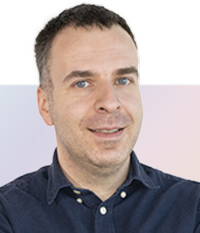
Title: Making Smart Systems Safe and Secure:
Caveats and Blueprints from the Automotive Industry
Abstract: Smart systems and technologies continue to proliferate across industry domains. The introduction of digital technologies and complex software in the consumer industries, such as the Internet or media distribution, was a success story. However, the introduction of software-defined approaches in safety and security-critical industries, such as smart cities, factories or mobility, presents many caveats. In the talk, we are dissecting the blueprints for safe and secure developments in the automotive industry, applied to automated and autonomous driving. The audience would be offered a comprehensible overview of how modern standards, such as ASPICE, ISO 26262 and ISO 21434 can be applied in companies to construct a compelling safety and security case for road vehicles and their items. Caveats and key challenges around software complexity will be presented, giving ideas on how to bridge the gap between the agility and somewhat ad-hoc practices of present-day software engineers, with the rigor required to deliver safe and secure solutions.
CV: Dr. Bjelica is a Full Professor at the FTN Uni Novi Sad, a Functional Safety Instructor at the University of California San Diego, and the CEO of NIT Institute. He actively participates in research and innovation activities for various computer-engineering sectors, focusing on consultancy and training in the fields of system safety, functional safety, automotive engineering, and consumer electronics. During his career, he consulted companies in the automotive industry (ZF Germany, TTTech Austria, Qualcomm Automotive USA, Daimler Germany) and also other companies in consumer electronics, industrial machinery, and computing domains. He is a distinguished lecturer by the IEEE Product Safety Engineering society and a frequent participant and a speaker at major industry events worldwide. Dr. Bjelica holds a Ph.D. degree in computer engineering from the University of Novi Sad, Serbia, as well as an Academic Safety Engineer degree from the FH CampusWien – Vienna Institute for Safety and Systems Engineering (Austria). His professional and research focus is on complex system and software architectures with specific interactions and virtualization. He authored over 100 publications across major journals and scientific conferences and holds 30 patents.
PAPER SUBMISSION AND PUBLICATION
All papers submitted to the conference must not have been published, submitted or accepted for publication elsewhere. IEEE policy regarding plagiarism and duplicate submission/publication will be strictly enforced. All papers will be judged on the basis of their clarity, relevance, originality, and contribution. Manuscripts will be limited to 6 (IEEE style) pages, up to 8 pages with additional costs. Papers should be submitted electronically via the on-line submission system. Paper submission should follow the IEEE double-column format for conferences (templates will be available via the conference web site). Submitted papers will undergo a peer review process coordinated by the Program Committee. All submissions must be in English. Authors of accepted papers are required to register for the conference and attend the conference in order to have the paper included in the SST 2024 Proceedings and submitted for posting to the IEEE Xplore database and other indexing databases. IEEE members will get a discount on the conference registration fee. Selected papers presented at the Conference will be invited for possible journal publication (International Journal of Electrical and Computer Engineering Systems) in expanded form and after a new round of review.
Paper Templates
Microsoft Word 2003
- A4 (DOC, 56 KB)
LaTeX Archive Contents (PDF, 63 KB)
- Windows (ZIP, 700KB)
LateX Bibliography Files
- Windows (ZIP, 309 KB)
For more details, please visit http://www.ieee.org/conferences_events/conferences/publishing/templates.html .
Paper Submission
PLEASE FOLLOW THE GUIDLINES GIVEN BELOW WHEN SUBMITTING THE FINAL VERSION OF THE PAPER
To ensure the accepted papers will be included in the conference proceedings and IEEE Xplore, the camera-ready versions of the papers and all additional documents (the IEEE Copyright and Consent Form and Responses to Reviewers Comments) must be uploaded to EasyChair by July 20, 2024, as described in Step 6.
However, there are few steps that must be taken before final submission:
Step 1. Make sure that your paper adheres to the IEEE standard and it follows the IEEE conference template,
Step 2. The paper is revised taking into account the suggestions made by the reviewers. If you got comments regarding the English language please have your paper proof read by a native English speaker, or seek online services to improve the language of your paper.
Step 3. The paper must be unpublished and must not be submitted or under review for publication elsewhere. IEEE policy regarding plagiarism and duplicate submission/publication will be strictly enforced. Furthermore, make sure that your paper is substantially different from (your) previously published work. This can be checked using eg. Ephorus (http://www.ephorus.com/).
Step 4. Proofread your source document thoroughly to confirm that it will require no revision.
Step 5. Add the copyright notice at the bottom of the first page of your source document.
- For papers in which all authors are employed by the US government, the copyright notice is:
U. S. Government work not protected by U.S. copyright - For papers in which all authors are employed by a Crown government (UK, Canada, and Australia), the copyright notice is:
979-8-3503-8639-4/24/$31.00 ©2024 Crown - For papers in which all authors are employed by the European Union, the copyright notice is:
979-8-3503-8639-4/24/$31.00 ©2024 European Union - For all other papers the copyright notice is:
979-8-3503-8639-4/24/$31.00 ©2024 IEEE
Step 6. Upload your final paper and supplementary files to EasyChair
The following files should be generated before submitting to EasyChair.
- The camera-ready version of the paper in DOC(x) or TEX format (including figures) and in PDF format checked using IEEE PDF eXpress, please see below “CREATING YOUR PDF EXPRESS ACCOUNT”
- Responses to reviewers comments (PDF or DOC(x)), please see below “RESPONSES TO REVIEWERS’ COMMENTS”
- Add all the files to one zip archive and upload through EasyChair
In order to upload your final paper and supplementary files log into the SST2024 EasyChair submission page at https://easychair.org/conferences/?conf=sst2024
CREATING YOUR PDF EXPRESS ACCOUNT
Log in to the IEEE PDF eXpress site
First-time users should do the following:
- Select the New Users – Click Here link.
- Enter the following:
- 61991X for the Conference ID
- your email address
- a password
- Continue to enter information as prompted.
An Online confirmation will be displayed and an email confirmation will be sent verifying your account setup.
Previous users of PDF eXpress or IEEE PDF eXpress Plus need to follow the above steps, but should enter the same password that was used for previous conferences. Verify that your contact information is valid.
Contacting PDF eXpress Support
Access the Publications Support Center for IEEE PDF eXpress. If you do not find an answer in the Find Answers tab, go to the Ask A Question tab. Your question will be forwarded to IEEE PDF Support and answered within 3 business days.
IMPORTANT: Any changes made to a PDF after IEEE PDF eXpress Plus conversion or PDF checking may invalidate Xplore compatibility. This includes headers, page numbers, copyright notice, watermarks, etc. If any of these elements are desired, they should be added to the document before a PDF is created.
IEEE COPYRIGHT AND CONSENT FORM
The IEEE Electronic Copyright Form (eCF) must be completed and digitally signed for your paper (one form per paper, not per author). Upon acceptance of your paper, the corresponding author of the paper will receive an email with detailed instructions on how to sign the electronic copyright agreement through EasyChair. Please note that if the electronic copyright agreement is not signed, the paper will not be published in the proceedings or IEEE Xplore.
RESPONSES TO REVIEWERS’ COMMENTS
Create a file containing responses to reviewers’ comments (PDF or DOC(x)). The file should contain all reviewers’ comments with a response below each comment.
NOTICE:
NO PAPER WILL BE PUBLISHED WITHOUT THE AUTHOR’S COMPLETED REGISTRATION AND PAYMENT. More information about registration and payment is available here: https://sst-conference.org/index.php/registration-2024/. Furthermore, kindly notice that at least one author should present the paper at SST 2024 conference.
SPONSORS, DONORS AND SUPPORT
ORGANIZING SPONSOR
Organized and sponsored by
J. J. Strossmayer University of Osijek,
Faculty of Electrical Engineering, Computer Science and Information Technology Osijek
CO-ORGANIZERS
TECHNICAL CO-SPONSORS
MAIN CONFERENCE SPONSORS
SPONSORSHIP PACKAGES
|
International Conference on Smart Systems and Technologies 2024 |
Bronze sponsor |
Silver sponsor |
Gold sponsor 1800 EUR + VAT |
|
The logo and link to your website will be highlighted on the website of the conference (sponsorship site) before and after the conference until the beginning of the next conference |
+ |
+ |
+ |
|
Free conference registration fee |
1 registration fee |
2 registration fees |
3 registration fees |
|
The logo will be featured on all printed promotional material of the conference |
25% of the largest format |
50% of the largest format |
the largest format * |
|
The logo will be highlighted in the proceedings of the conference |
25% of the proceedings page |
50% of the proceedings page |
Whole proceedings page |
|
Possibility of poster presentation (content can be defined independently) |
– |
1 poster |
2 posters |
|
Possibility of placing a commercial “roll-up” in the conference venue |
– |
1 roll-up |
1 roll-up |
|
Possibility to deliver your promotional brochure to be placed in a conference bag to be received by each participant |
– |
+ |
+ |
|
Your company will have a presentation stand in the conference room that you can arrange if you wish |
– |
– |
+ |
|
Emphasizing cooperation in media statements |
– |
– |
+ |
|
The logo will be highlighted on the homepage of the web site (in footer) |
– |
– |
+ |
* the size depends on the type and size of the promotional material
There is also the possibility of donating the amount by donor selection, whereby the name of the donor company/institution will be listed in the electronic and printed materials of the conference.


